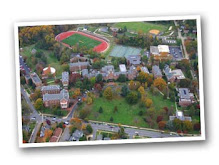Wednesday night was Junior College Parent Night.
It was the first of two formal meetings with parents.
The next one is with students in January to kick off
The College Seminar.
We had a full house on Wednesday and covered a number of topics related to the college process ahead for their student.
Perhaps you have a student starting their junior year, and you are a bit overwhelmed with where to start, what is ahead, what you should be doing, what your student should be doing.
Hopefully these next three posts will help allay mounting anxieties and provide some clearheaded direction.
So where did we start.
We started with first things.
If we keep first things first, second and third things will click into place.
So what comes first?
Simple.
Your student.
It's one of our motto's:
The student first; the school second.When we think about your student, our overarching mission is to partner with families to discern the best college fit.We like to think of "best fit" in terms of four broad categories.
The first category for fit involves learning style.
Here is a simple question you can ask your student to generate discussion about the style of instruction that best suits him or her:
If given a choice, would you
A) take a scantron test,
B) take an essay test,
or C) write a paper.
I didn't learn until my freshman year in Dr. Grady's American Literature II class that I was suited for the take home paper. I got a C in Macroeconomics. Every test was rife with bubbles to fill in. But in Dr. Grady's class there were no bubbles. Just two major papers. I got A's on both of them and loved the writing process. It only took one semester in college to switch from business to English as a major.
In addition, some students learn best in a lecture format. Other students thrive in a seminar format. Does your student retain ideas and information from listening and note taking? Or does your student retain through dialogue and conversation?
The answer to these questions can help identify the kind of learning style that best fits your student.
The second category for fit is passion.
Sometimes students develop a passion
inside the classroom.
I think, for example, of Aly M who developed a passion for Manderine Chinese in Mr. Svaboda's class. After four years of Chinese and two trips to China, Aly's college search focused on unique programs in Chinese. She is now at the University of Rhode Island, a scholar in their
Flagship Chinese Leadership program. Other times students develop a passion for something
outside the classroom. That's Ben M who back in the 7th grade starting studying films, watching
Pulp Fiction every night, dissecting frame by frame. He's now at UT-Austin studying tv-film in the
College of Communications.
And then there are students who develop a passion for something that overlaps both inside and outside the classroom. That's Nathan P. On Facebook last week, he posted that he had made the Duke Symphony Orchestra. Nathan's love for the bass violin was nurtured in the classroom at Casady, but now as a freshman, he's studying
Biochemical Engineering. At Duke Nathan is able to pursue his passion for the bass violin, but not as a lover of music not as a pre-professional student.
So whether it is a subject in the classroom, or an extracurricular activity outside the classroom, students want to look for colleges where they can pursue their passions.
The third category for fit involves admissibility + competitiveness.
To be admissible means that you have the basics for what the school needs for their profile. Your grades and test scores fall in their median range.
To be competitive, though, means that you have something that the school wants to move their profile forward. Sometimes it involves high grades and test scores. But often it involves something else. This is where the "hook" comes into play. A hook, by definition, is a competitive credential that elevates you as an applicant. The ability to play a sport? The ability to pay full freight? The family's ability to build a new rec center on campus? The color of your skin? The bubble you fill in for gender? The part of the country you hale from? Whether or not your parent is an alumni of the school? The academic discipline you are interested in? These are the kinds of hooks that can move a student from admissible to competitive.
The goal is to find schools where you are both admissible and competitive.
The fourth and final category for fit involves affordability.
Simply put, you have to ask honestly if as a family you can afford the price tag. Now many schools, especially private institutions, will discount and remove most (but not all) of the sticker shock. Nevertheless, with rising tuition costs, and the depreciating value of certain college diplomas, you really have to look at whether or not paying X amount of dollars is worth it. That's where as a family you have to decide what you value.
It's important then as you move forward into the college process that you are constantly thinking about the kinds of schools that fit your student's learning style, their passions, their admissibility + competitiveness, and affordability.




















